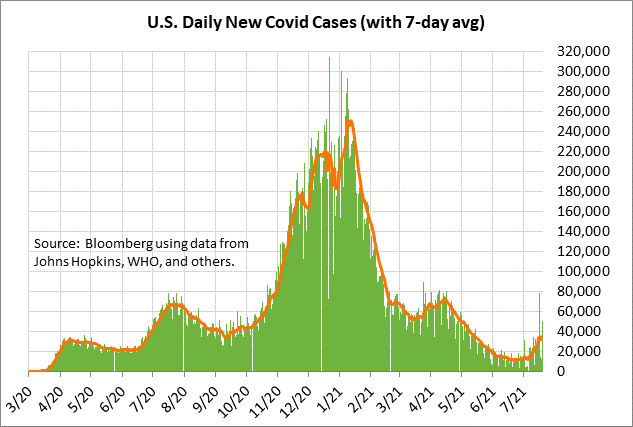- Today’s Senate cloture vote on the bipartisan infrastructure bill is expected to fail
- 20-year T-note auction to yield near 1.79%
- Delta variant surges to 83% of U.S. Covid cases
Today’s Senate cloture vote on the bipartisan infrastructure bill is expected to fail — Senate Majority Leader Schumer plans to hold a procedural cloture vote today on the bipartisan infrastructure bill. The vote will be on a shelf bill since the bipartisan group of Senators still hasn’t reached a final agreement on a bill. Mr. Schumer said if the bipartisan group of Senators can agree on the legislative text of a bill within the next few days, that bipartisan legislative text will be substituted for the shelf bill.
Today’s vote seems destined to fail since the moderate Republican Senators working on the bipartisan infrastructure have said they plan to vote against today’s cloture vote because the agreement hasn’t been finalized. Republican Senators such as Collins and Romney have called on Mr. Schumer to delay the cloture vote until next week.
Today’s vote requires 60 Senators to vote in favor, which means it will fail unless the vote gets all 50 Democratic Senators to vote in favor plus at least 10 Republican Senators. Mr. Schumer says that today’s vote is simply a procedural vote to bring the issue to the floor for debate and that final legislation is not yet needed. However, Republican Senators don’t want to advance a ghost bill that they may end up opposing.
If Mr. Schumer goes ahead with today’s cloture vote, he may sufficiently alienate the Republican Senators and ensure that there will never be a bipartisan bill. Some progressive Democrats would be happy with that outcome since Republicans would then be unable to further delay the legislation and Democrats could proceed with their own spending bill under the budget reconciliation process.
If Mr. Schumer goes ahead with today’s vote, he must at least get all 50 of his Democratic Senators to vote in favor. It would be an embarrassment for Mr. Schumer if even one Democratic Senator votes against today’s bill.
After today’s expected failure of the cloture vote on the $579 billion infrastructure bill, the question will be whether the bipartisan attempt to reach an agreement on an infrastructure bill continues to limp along, possibly allowing Mr. Schumer to hold another cloture vote later in July. Alternatively, if Mr. Schumer has sufficient support from moderate Democratic Senators, he could declare the bipartisan infrastructure bill dead today and Democrats could simply add the $579 billion infrastructure bill to their $3.5 trillion budget resolution.
Separately, Mr. Schumer is planning to hold a vote on the $3.5 trillion budget resolution as soon as it is finalized. The details of that resolution have yet to be released. Mr. Schumer needs to make sure that all 50 Democratic Senators are on board with the budget resolution, including the moderate Democratic Senators such as Manchin and Sinema.
The budget resolution cannot progress unless it gets all 50 Democratic Senators to vote in favor, plus Vice President Harris as the tie-breaker. Democrats are expected to work on the actual reconciliation bill this autumn when they return from their August recess.
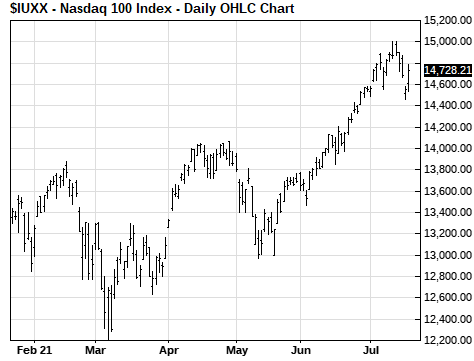
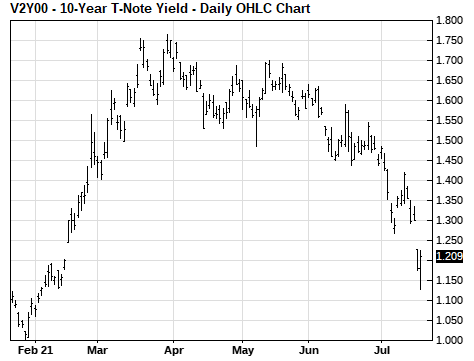
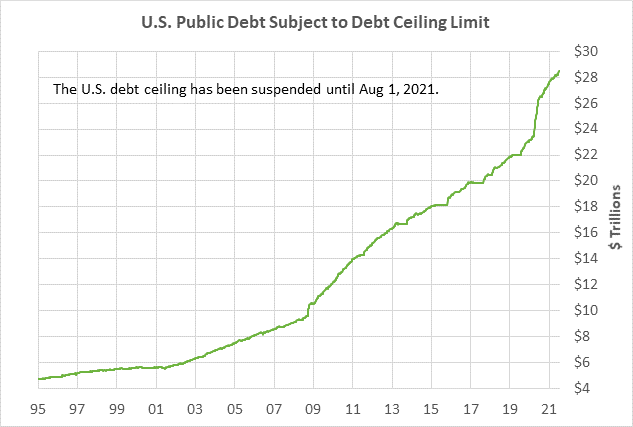
20-year T-note auction to yield near 1.79% — The Treasury today will sell $24 billion of 20-year T-bonds in the second and final reopening of the 2-1/4% 20-year bond of May 2041.
Today’s 20-year T-note issue was trading at 1.79% late yesterday afternoon. The 20-year T-note yield yesterday fell to a new 5-1/2 month low of 1.69%, before rebounding higher to close up +5 bp at 1.79%. The 20-year bond yield has fallen sharply by -63 bp to the current level of 1.79% from March’s peak of 2.42%.
The 12-auction averages for the 20-year are as follows: 2.35 bid cover ratio, $3 million in non-competitive bids, 6.0 bp tail to the median yield, 109 bp tail to the low yield, and 52% taken at the high yield. The 20-year is mildly below average in popularity among foreign investors and central banks. Indirect bidders, a proxy for foreign buyers, have taken an average of 60.4% of the last twelve 20-year bond auctions, which is mildly above the median of 61.2% for all recent coupon auctions.
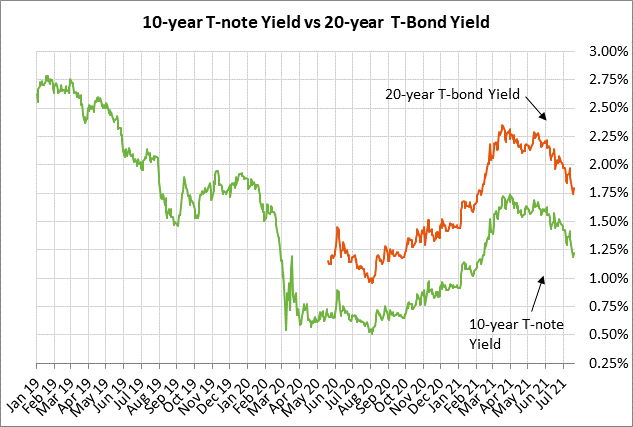
Delta variant surges to 83% of U.S. Covid cases — The highly-transmissible Delta variant has quickly become the dominant U.S. Covid strain. The CDC said yesterday that the Delta variant now accounts for a hefty 83% of U.S. Covid cases.
The 7-day average of new U.S. Covid infections reached a new 2-month high of 34,775 on Monday, which is more than triple the 16-month low of 11,351 posted about a month ago on June 23. The Delta variant is spreading mainly among people who have not received any vaccination doses, which is 44% of the U.S. population, according to the CDC.
Vaccination rates have slowed substantially in recent weeks due to the reluctance of some people to get a vaccination. Also, vaccinations have still not been approved for young children. The slow vaccination rates, combined with the more transmissible Delta variant, means that the U.S. will remain hobbled by the pandemic for at least a few more months, if not into next year.
